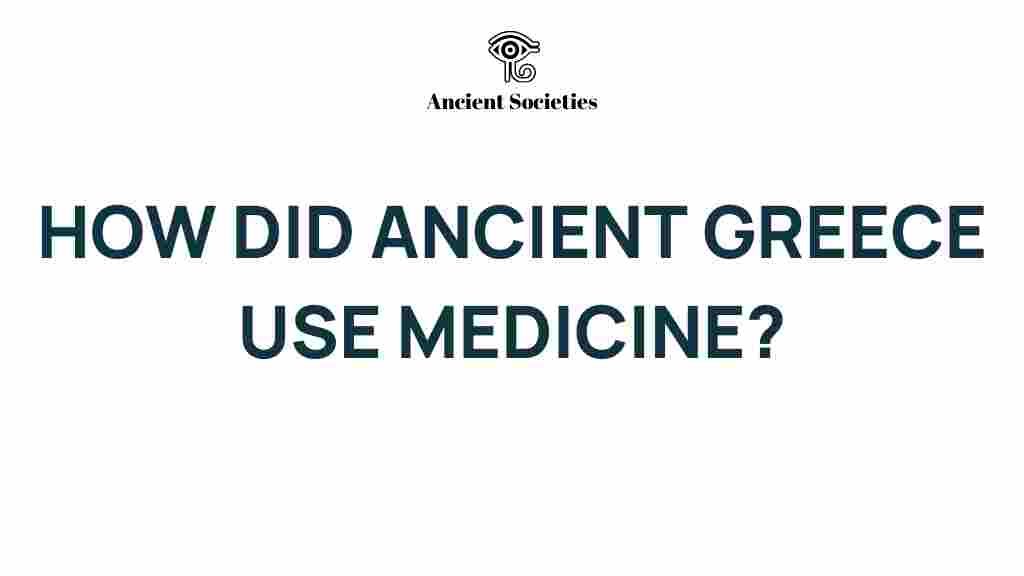Unveiling Ancient Greece: The Fascinating Role of Medicine
Ancient Greece, often hailed as the cradle of Western civilization, has left an indelible mark on various fields, including philosophy, politics, and of course, medicine. The medical practices in this ancient civilization were not just rudimentary; they were deeply intertwined with the culture, beliefs, and advancements of the time. This article explores the fascinating role of medicine in Ancient Greece, shedding light on its historical context, prominent figures like Hippocrates, and the various healing practices that laid the groundwork for modern medicine.
The Historical Context of Medicine in Ancient Greece
Understanding the role of medicine in Ancient Greece requires a look at the historical and cultural backdrop of the period. Medicine during this time was a blend of empirical knowledge and spiritual beliefs. The Greeks sought to explain diseases and ailments through naturalistic means rather than attributing them solely to divine intervention.
- Early Practices: Initial medical practices were often a mix of herbal remedies and spiritual healing.
- Influence of Asclepius: The god of healing, Asclepius, was central to Greek medicine, with temples dedicated to him serving as healing centers.
- Development of Medical Schools: Institutions like the School of Cos became hubs for medical knowledge and training.
The Contributions of Hippocrates
No discussion on Ancient Greece and medicine would be complete without mentioning Hippocrates, often referred to as the “Father of Medicine.” His contributions were monumental in shaping the medical practices of the time and have continued to influence modern medicine.
- Hippocratic Corpus: A collection of texts attributed to Hippocrates and his followers, laying the foundation for medical ethics and practice.
- Naturalistic Approach: Hippocrates emphasized observation and clinical examination, arguing that diseases had natural causes.
- Four Humors Theory: He proposed that health was a balance of four bodily fluids: blood, phlegm, yellow bile, and black bile.
Medical Practices in Ancient Greece
The medical practices in Ancient Greece were varied and evolved over time. They incorporated a range of techniques and philosophies that contributed to the understanding of human health.
1. Herbal Remedies
Herbal remedies played a crucial role in Ancient Greek medicine. Physicians often relied on the healing properties of plants to treat various ailments. Some common herbs used included:
- Willow Bark: Used for pain relief, it is now known to contain salicylic acid, the active ingredient in aspirin.
- Garlic: Valued for its health benefits, garlic was used to boost the immune system.
- Chamomile: Known for its calming effects, it was used to aid digestion and sleep.
2. Surgical Procedures
While not as advanced as modern techniques, Ancient Greek surgeons performed various procedures, including:
- Trepanation: A method of drilling holes into the skull to treat head injuries.
- Amputation: In cases of severe injury or infection, limbs were sometimes amputated.
- Wound Treatment: Use of bandages and ointments to treat external wounds.
3. Holistic Healing
Ancient Greek medicine was also characterized by a holistic approach. Physicians believed in treating the whole person rather than just the symptoms. This included:
- Dietary Recommendations: Emphasis on a balanced diet to maintain health.
- Exercise: Regular physical activity was encouraged as part of a healthy lifestyle.
- Mental Health: Attention to the psychological well-being of patients.
The Cultural Impact on Healing Practices
The cultural beliefs of Ancient Greece greatly influenced its medical practices. Health and illness were often viewed through a mythological lens. Temples dedicated to Asclepius were not just hospitals but sacred places where the sick would seek divine intervention alongside medical treatment.
Moreover, the Greeks believed in the importance of purity and balance, which was reflected in their approach to health. They sought harmony in both body and mind, emphasizing the interconnectedness of physical and mental health.
Challenges and Misconceptions in Ancient Greek Medicine
Despite its advancements, Ancient Greek medicine faced numerous challenges and misconceptions:
- Lack of Anatomical Knowledge: Limited understanding of human anatomy often hindered medical practices.
- Superstitions: Many treatments were influenced by superstitions, leading to ineffective practices.
- Social Status: Access to medical care was often limited to the elite, leaving lower classes with fewer options.
Modern Reflections on Ancient Greek Medicine
Today, the legacy of Ancient Greek medicine continues to resonate in modern medical practices. Many principles established during this time have laid the groundwork for contemporary medicine. The Hippocratic Oath, which emphasizes ethical standards in medicine, remains a fundamental part of medical training today.
Furthermore, the resurgence of interest in herbal remedies and holistic approaches can be traced back to ancient practices. As we explore the potential of natural healing, the wisdom of Ancient Greece offers invaluable insights.
Conclusion: The Enduring Legacy of Ancient Greek Medicine
The role of medicine in Ancient Greece was a multifaceted tapestry woven from the threads of culture, philosophy, and empirical observation. From the pioneering efforts of Hippocrates to the widespread use of herbal remedies, the practices of this ancient civilization have profoundly shaped the course of medical history.
As we continue to delve into the past, we uncover the richness of Ancient Greek medicine and its influence on our current understanding of health and healing. The lessons learned from this remarkable civilization remind us of the importance of holistic approaches and the enduring quest for knowledge in the field of medicine.
To learn more about the historical significance of medicine in various cultures, check out our comprehensive guide. For further reading on herbal remedies and their origins, visit this informative resource.
This article is in the category History and created by AncientSocieties Team
